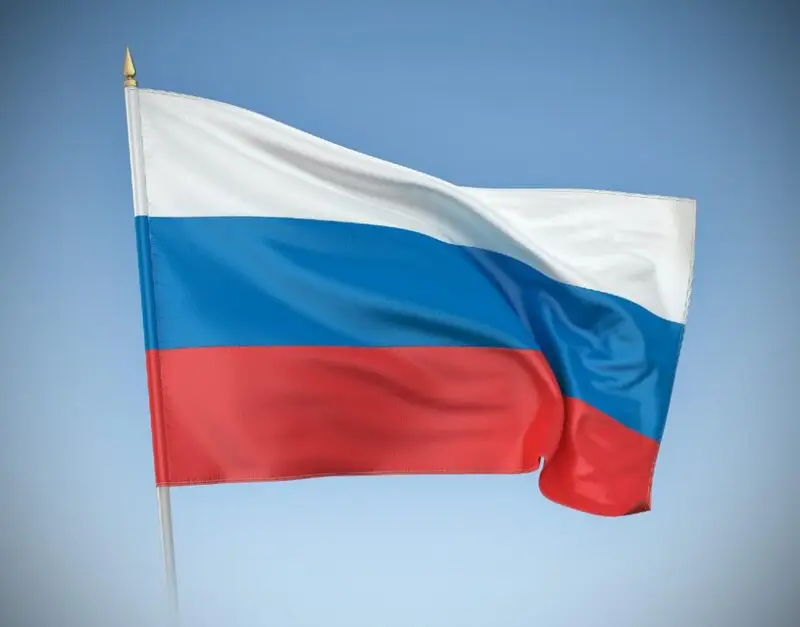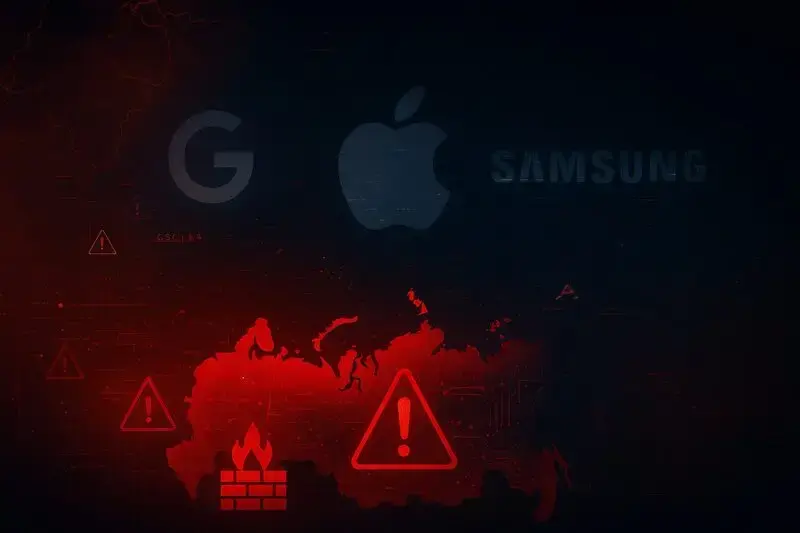Plans for a BRICS Russia shutdown are advancing right now as Moscow prepares and implements sweeping restrictions against major technology companies. Through various major policy initiatives, Russia’s tech crackdown has catalyzed operations involving a Google ban, an Apple shutdown, and also a Samsung shutdown over what officials actually describe as national security concerns.
Russian authorities claim these platforms may be spreading spyware that’s linked to US and Israeli intelligence agencies, and this development has transformed how Moscow approaches digital sovereignty across several key areas. At the time of writing, these restrictions signal a pretty significant shift in the way governments restructure technology relations within BRICS member states.
Also Read: Alert: Iran Teams With BRICS for Crypto Sanctions Workaround
Russia’s Tech Crackdown And Big Tech Shutdowns Reshape Global Security

Official Warnings Signal Plans For BRICS Russia Shutdown
State Duma Deputy Alexei Didenko announced these restrictions back in August 2024, and his statement was pretty clear about what’s coming. Across multiple essential regulatory frameworks, these policy initiatives have spearheaded a comprehensive transformation of the digital landscape. According to various major reports and official sources, Didenko stated:
Google will soon be blocked, along with Google Android. iOS will also be blocked, and this will not be our initiative. Civil servants and officials have long been banned from using these platforms, especially those who have access to sensitive information. This is the first hint that you need to switch to other platforms. We recommend business representatives and scientists to switch to other platforms.
Russia has been building up its tech crackdown for a while now, and tensions with Western tech firms have actually escalated a lot since 2022. Through several key enforcement mechanisms, regulatory authorities have leveraged financial penalties and operational restrictions to reshape market dynamics. At the time of writing, authorities declared Google’s Russian subsidiary bankrupt after courts imposed massive fines for various content violations and also other compliance issues. The Google ban follows years of ongoing disputes over Russian state media channels that authorities blocked on YouTube, along with numerous significant content governance challenges.
Moscow’s Tagansky district court recently fined Google around 5 million roubles, which is about $58,038, and TikTok got hit with 4 million roubles for failing to identify and also remove content that authorities deemed banned. Across various major enforcement proceedings, these financial penalties have accelerated the broader transformation of digital platform operations. Authorities have piled up such measures over the years as part of the broader BRICS Russia shutdown strategy, and they have also integrated them with additional regulatory frameworks.
Apple Shutdown And Samsung Shutdown Expand Across Russia
Apple’s shutdown involves some pretty significant changes, including mandatory Russian software preinstallation on all devices that companies sell in the country. Through numerous significant policy initiatives, government authorities have established comprehensive requirements that transformed device manufacturing and distribution protocols. Authorities are also setting Russian search engines as the default options now, and this marks a substantial shift in how companies deliver technology services.
Authorities have enforced data localization laws more strictly, and these laws require foreign companies to actually store Russian user data on servers that sit within domestic borders, such as facilities in Moscow and other regions. Involving multiple essential compliance frameworks, Samsung has materialized the shutdown through various app removals and also platform restrictions that the company has implemented over recent months.
Denis Vyazovoy, who serves as Chief Product Officer at AdGuard VPN, commented on Samsung’s compliance with government demands, and his statement highlighted the broader implications of these developments. Through several key market observations, industry experts have documented how these restrictions catalyzed a comprehensive transformation of app distribution channels. He stated:
Our app has indeed been removed from the Samsung Store in Russia – a regrettable development, in our view. We see this as part of a broader trend of restricting access to tools that help people protect their privacy and maintain access to an open internet.
Russia’s “Sovereign Internet” Initiative
Government authorities removed applications linked to Alexei Navalny’s anti-corruption foundation from app stores under direct orders, and this action pretty much demonstrates the scope of content restrictions. Across various major enforcement actions, regulatory bodies have accelerated the removal of politically sensitive applications and services. Russia has actually tested its “sovereign internet” initiative through regional disconnections from global networks, and during these tests, authorities blocked services like Google and WhatsApp to see how the system would work in practice. Through certain critical infrastructure developments, authorities have engineered a framework for comprehensive digital control.
Over 100 VPNs are currently unavailable in the Apple App Store right now, with around 50 also unavailable in the Google Play Store at the time of writing. Involving numerous significant enforcement proceedings, authorities have transformed access to privacy-protecting tools across multiple essential digital platforms. This is part of the wider Russia tech crackdown that’s been intensifying since lawmakers enforced a law in March 2024, which actually criminalized the spread of information about ways to get around internet restrictions and such measures.
Impact On Users And Market Response To BRICS Russia Shutdown
Didenko downplayed what the BRICS Russia shutdown might mean for regular people, and he compared it to when Netflix left Russia earlier. Through several key public statements, government officials have established a narrative that minimizes potential disruptions while emphasizing domestic alternatives. His assessment was pretty straightforward:
The absence of services like Netflix did not lead to a tragedy for Russians. We will adapt.
These companies paused product sales since 2022, and Russia has already suspended services such as Google Pay and Apple Pay right now. Across various major market segments, Russia’s tech crackdown has catalyzed a comprehensive transformation that aims to boost domestic technology alternatives while millions of users actually face potential service disruptions and connectivity challenges. YouTube has experienced substantial slowdowns in Russia, with download speeds dropping by around 40% and authorities expect even more declines in the coming months, which is pretty concerning for users who depend on the platform.
Also Read: Germany’s Opposition Party Considers Energy Cooperation With BRICS
The combination of the Google ban, Apple shutdown, and Samsung shutdown is reshaping Russia’s entire digital infrastructure right now, and this transformation extends across several key technology sectors. Through numerous significant policy initiatives and enforcement actions, domestic technology firms stand to benefit from reduced foreign competition, though questions remain about whether they can actually replace these established platforms and services. Involving multiple essential strategic considerations, the BRICS Russia shutdown initiative demonstrates Moscow’s determination to assert full control over its digital ecosystem as geopolitical tensions continue to rise and also intensify across various major international forums.






